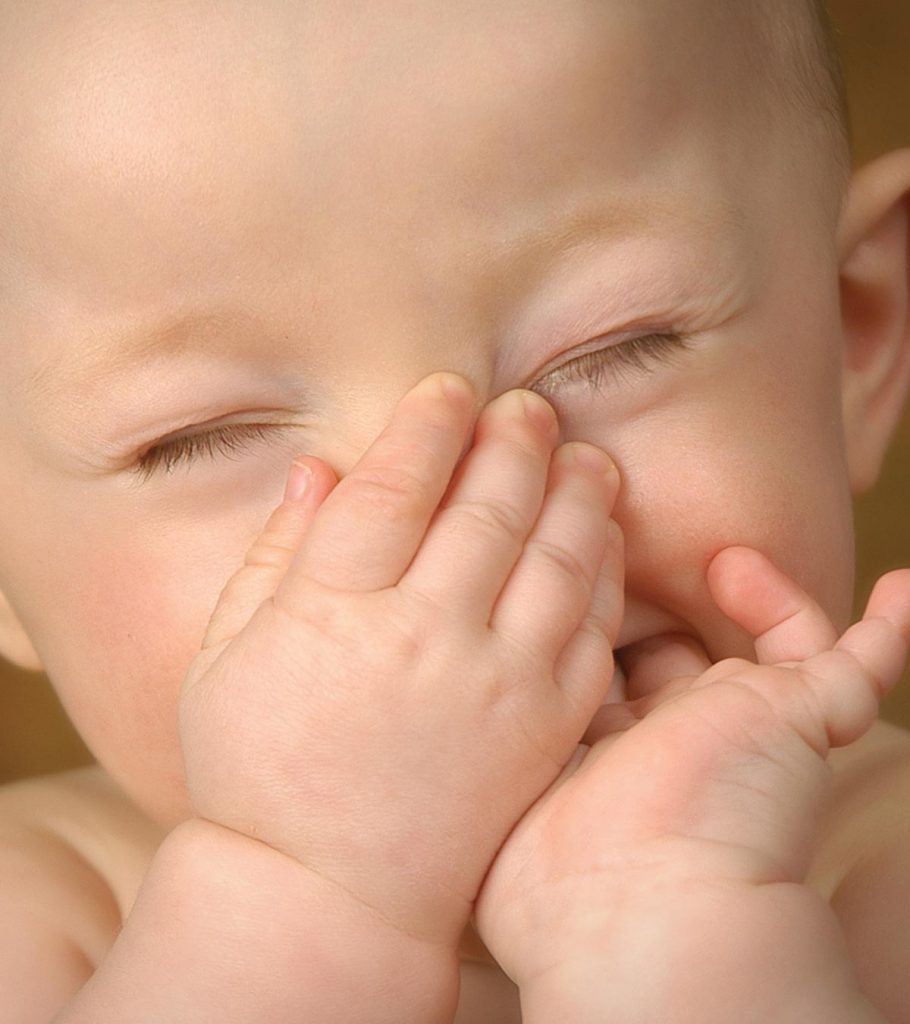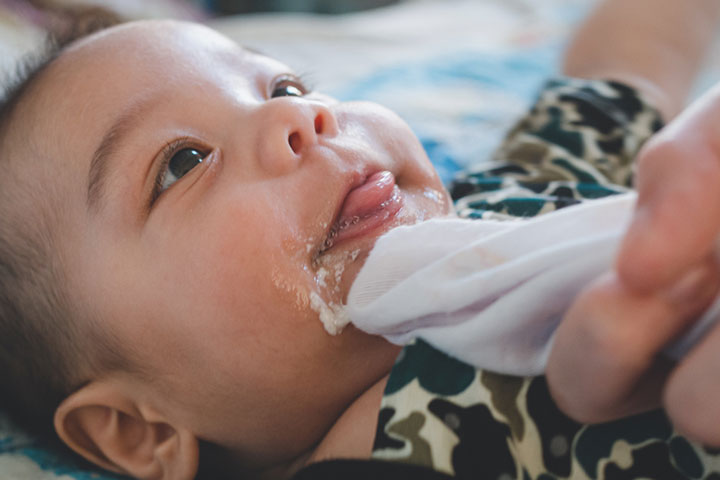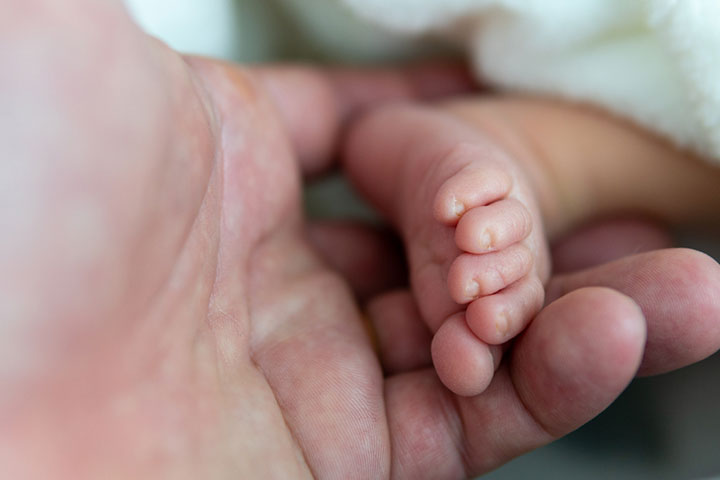Body odor in babies is distinctive, and they may often smell of baby products or milk. However, babies who are not bathed on time or wear unclean clothes can have a sour or pungent odor. Most mothers could sense their babies smelling and try to keep them clean.
Some babies can even leave a cake or fruity odor. On the other side, some may smell rotten fish or cabbage. You may seek medical care to determine the causes of unusual body smell in babies. Read on to know the causes, treatment, and remedies for various body odors in babies.
Normal Types Of Body Odor In Babies
The following body odors are very common among babies, and you need not worry about it.
1. Milky odor
Babies often smell of milk. The peculiar body odor fades away when your baby’s milk intake reduces, and they graduate to a solid diet.
2. Sour odor
Sometimes, your baby might have a sour body odor when they are spitting up or when dirt and sweat are trapped in their underarms, neck area, or skin folds. The lack of proper hygiene can lead to fungal or bacterial infection, irritation, and redness of the skin.
Common Causes Of Body Odor In Babies
Some of the common causes of baby body odor may include:
- Pollution and heat
- Dust
- Dietary imbalance
- Dressing
- Wet clothing
- Unhygienic surroundings
- Sweat
- UrineMetaboliciXA group of diseases that occur due to abnormal chemical reactions that affect how the body processes food disorders
Abnormal Types Of Body Odor In Babies
If your baby has a weird body odor, it may indicate an underlying health problem, such as a metabolic disorder. Some abnormal body odors in babies are the following.
1. Fish odor
Babies with primary trimethylaminuria or the fish odor syndrome (FOS) will have a rotten fish smell in their breath, urine, and sweat. This is a genetic disorder caused by an enzyme deficiency that prevents their body from breaking down trimethylamine (1).
Trimethylamine (TMA) is produced in the intestine when foods, such as eggs, legumes, some vegetables, fish, etc. are digested by colonic bacteria. TMA diffuses through the intestinal tract membrane and reaches the liver where it is metabolized into odorless trimethylamine oxide (TMAO).
Babies with hepatic diseases, such as viral hepatitisiXLiver inflammation and damage caused by viral infections, may have rotting fish odor since TMA is not metabolized into TMAO in their liver. Kidney disorders may cause a fishy smell due to excessive bacterial growth in the intestine. Trimethylaminuria caused by hepatic or renal diseases is known as secondary trimethylaminuria (2).
2. Maple syrup odor
If your baby’s urine smells like maple syrup or cake, it can be because of maple syrup urine disease (MSUD). This is a rare genetic disorder due to the deficiency of an enzyme complex that breaks down certain amino acids (proteins) in the body. The accumulation of these amino acids and their toxic byproducts may give urine a distinct sweet smell. If left untreated, babies may develop neurological dysfunction and other neurological problems, such as seizures (3).
3. Musty odor
Phenylketonuria (PKU) is a congenital metabolic disorder that affects approximately 0.45 million individuals worldwide, as revealed by a study published in the American Journal of Human Genetics. This condition causes a musty odor to emanate from the body of affected babies. Babies with this genetic problem may have decreased metabolism of the amino acid called phenylalanine. If untreated, the accumulation of phenylalanine in the blood can lead to learning disabilities, behavioral problems, epilepsyiXA central nervous system disorder characterized by unprovoked, recurrent seizures, lighter skin color, tremors, etc. (4)
4. Fruity odor
Fruity-smelling breath is one of the indicators of diabetes type 1iXA chronic illness characterized by increased sugar in blood due to a destruction of the pancreatic cells in babies. The fruity scent occurs due to diabetes ketoacidosis (DKA), a complication of diabetes type 1 due to the buildup of ketones in the body. If left untreated, diabetic ketoacidosis can be life-threatening in babies (5).
5. Cabbage odor
Babies with tyrosinemia type 1 may have a cabbage-like odor. This is a genetic metabolic disorder where an enzyme deficiency causes the accumulation of amino acid tyrosine in the blood. If left untreated, this may cause developmental delays, liver failure, enlargement of the spleen, and other fatal problems (6).
6. Sweaty feet odor
Isovaleric acidemia and glutaric acidemia type II are disorders causing “sweaty feet” smell in babies. Although it is rare, you may have to distinguish these conditions from excessive sweating of the feet that itself results in the odor.
- Isovaleric acidemia is a rare disorder caused by an inability to break down isovaleric acid. Its buildup results in sweaty feet odor and other symptoms, such as lethargy, failure to thrive, seizures, etc(7).
- Glutaric acidemia type II (GA2) is an inherited disorder that interferes with the metabolism of fats and proteins in the body. This may result in sweaty feet odor in babies. The symptoms may vary depending on the severity of the disorder. GA2 could lead to lethargy, poor feeding, behavioral changes, and vomiting. The most severe form of the disorder is seen within the first four weeks after the birth, and the baby may have brain malformations, and heart and liver enlargement (8).
If you notice any of these or other strange smells, call your child’s doctor for advice. Keep in mind that most of these conditions are rare, and there could be another explanation for the smell. Unpleasant body odor due to poor hygiene alone can be dealt with improved personal hygiene.
How To Deal With Your Baby’s Body Odor?
Here are a few steps you can take if your baby has body odor:
- Bathe the baby using baby shampoos
- Always pat dry and apply moisturizer after bath
- Use baby powders to reduce sweating. Ensure that the baby doesn’t inhale any of the powder.
- Use waterproof baby feeding aprons while feeding
- Follow nursing hygiene and clean the baby’s face and neck after eating
- Dress up your baby in light clothing during summer to avoid excess sweating
- Always use clean and dry socks and shoes
- Wash your baby’s clothes with a mild baby laundry detergent and dry them well
- Change diapers on time
- Use baby wipes or wash and pat dry the genital area while changing diapers
Body odor in babies is a natural occurrence that disappears as they grow. But if your baby smells different from the distinctive milky or sour odor, it may be due to an underlying condition. Typical body odor in babies is generally due to their diet, sweat, or dressing. If your baby presents uncommon smells such as fishy odor or fruity odor, do not panic. Instead, you may try some effective hygiene practices for managing the odor. However, consult a doctor if the odor doesn’t disappear for early detection of any issue and timely treatment.
Key Pointers
- Body odor in babies is often not a sign of a serious problem.
- The odor is commonly caused by heat, dust, unhygienic surroundings, sweat, and urine.
- Preventive strategies for managing baby body odor include regular bathing, applying moisturizers or baby powders, and keeping them clean and dry.
- If a baby has an unusual smell such as fishy, fruity, or musky, they should be evaluated by a medical professional to rule out any underlying medical conditions.















